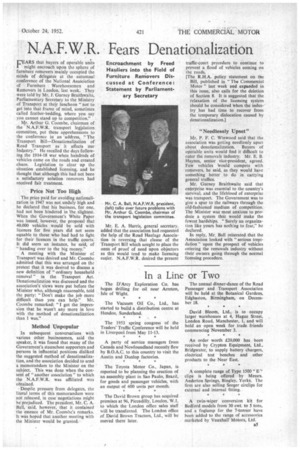NA F.W.R. Fears Denationalization
Page 39

If you've noticed an error in this article please click here to report it so we can fix it.
FEARS that buyers of operable units might encroach upon the sphere. of furniture removers mainly occupied the minds of delegates at the autumnal conference of the National Association of Furniture Warehousemen and Removers in London, last week. They were told by Mr. I. Gurney Braithwaite, Parliamentary Secretary to the Ministry of Transport at their luncheon "not to get into that frame of mind, sometimes called feather-bedding, where you say you cannot stand up to competition."
Mr. Arthur G. Coombe, chairman of the N.A.F.W.R. transport legislation committee, put these apprehensions to the conference in an 'address, "The Transport Bill—Denationalization of Road Transport as it affects our Industry." He recalled the days following the 1914-18 war when hundreds of vehicles came on the roads and created chaos. Legislation to clear up the situation established licensing, and he thought that although this had not been a satisfactory solution removers had received fair treatment.
Price Not Too High
The price paid for avoiding nationalization in 1947 was not unduly high and he declared that his business, for one, had not been hindered in 'the slightest. When the Government's White Paper was issued, however, the proposal that 40,000 vehicles would be sold with licences for five years did not seem equable to those who had had to fight for their licences in the traffic courts: It did seem an instance, he said, of " handing over to the big money."
A meeting with the Minister of: Transport was desired and Mr. Coombe admitted that this was arranged on the pretext that it was desired to discuss a new definition of "ordinary household removal " in the Transport Act. Denationalization was discussed and the association's views were put before the Minister who, although reasonable, told the party: "Don't make the job more difficult than you can help." Mr. Coombe remarked: "I got the impression that he wasn't any more in love with the method of denationalization than I was."
Method Unpopular In subsequent conversations with various other businessmen, said the speaker, it was found that many of the Government's staunchest supporters and persons in influential positions disliked the suggested method of denationalization, and the association decided to send a memorandum to the Minister on the subject. This was done when the consent of "another association" to which the N.A.F.W.R. was affiliated was obtained.
Despite pressure from delegates, the literal terms of this memorandum were not released, in case negotiations might be prejudiced. The president, Mr. C. A. Ball, said, however, that it contained the essence of Mr. Coombe's remarks. It was hoped that another meeting with the Minister would be granted. Mr. E. A. Harris, general secretary, added that the association had requested the help of the Road Haulage Association in reversing that clause of the Transport Bill which sought to place the onus of proof of need upon objectors as this would tend to make licensing easier. N.A.F.W.R. desired the present
traffic-court precedure to continue to prevent a flood of vehicles coming on the roads.
[The R.H.A. policy statement on the Bill, published in "The Commercial Motor" last week and expanded in this issue, also calls for the deletion of Section 8. It is suggested that the relaxation of the licensing system should be considered when the industry has had time to recover from the temporary dislocation caused by denationalization]
"Needlessly Upset"
Mr. P. F. C, Winwood said that the association was getting needlessly upset about denationalization. Buyers of operable units would find it difficult to enter the removals industry. Mr. E. B. Haynes, senior vice-president, agreed. Few vehicles 'Would compete with removers, he said, as they would have something better to do in carrying general traffics.
Mr. Gurney Braithwaite said that enterprise was essential to the country's survival, and the lifeblood of enterprise was transport. The Government was to give a spur to the railways through the old-fashioned medium of competition. The Minister was-most anxious to produce a system that would make the fewest hardships. "Surely an organization like yours has nothing to fear," he declared.
In reply, Mr. Ball reiterated that the Association looked with "serious trepidation" upon the prospect of vehicles entering the removals industry without their owners going through the normal licensing procedure.




















































































